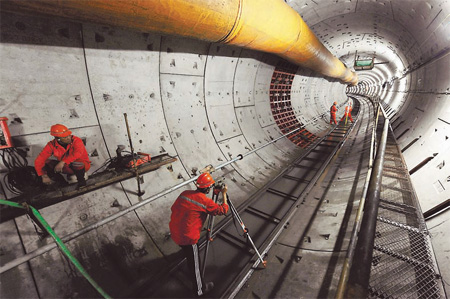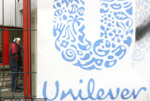Zhengzhou sets high goals for its own SOEs
Updated: 2011-08-30 11:00
By Zhuan Ti (China Daily)
|
|||||||||||
|
 Technicians on one part of the urban rail line in Zhengzhou, which is expected to go into operation in 2013. The State-owned Zhengzhou Urban Rail Co will have seven urban rail transit projects that cover 165.3 km.[Photo/Xinhua] |
The capital of Henan province recently came up with some ambitious plans to develop its State-owned enterprises (SOE) and improve its people's lives at the same time.
The municipal government of Zhengzhou's guidelines for its SOE reforms, under the 12th Five-Year Plan (2011-2015), predict that the SOE's will have total assets of 300 billion yuan, by 2015.
That is with an annual growth rate of 21 percent, operating revenues of 15 billion yuan, with an annual growth of 14 percent, and total profits of 2.6 billion yuan, with 22 percent in annual growth.
During that period, the municipal government will concentrate its capital in major areas that are crucial to social and economic development in the city.
The city expects to have around 30 municipal-government-administered SOEs by 2015.
The city wants to develop at least 15 major enterprises with their own brand name and property rights. It plans to support these enterprises to make them more competitive and to take advantage of large-scale production.
Four or five of these enterprises are expected to have assets of more than 10 billion yuan each, while 15 will have annual sales worth more than 100 million yuan.
Improved living standards
Over the next five years the government will also support those SOEs that are essential to its people's livelihood.
One SOE, the Zhengzhou Water Co, plans to put 5.36 billion yuan into a dozen water projects, by building five new water plants and upgrading four older ones.
The SOE will also lay 168.5 kilometers more of water pipes and upgrade 430.14 km.
Upon completion, the company will have added 850,000 tons daily in water capacity.
The city will also invest in related areas such as the national South-North Water Diversion Project.
By 2015, urban parts of Zhengzhou will have a daily water supply of 1.76 millions tons.
To save on water resources, 280,000 households will get their tap water through a reformed metering system.
The city says it is also giving attention to its public transport system and wants to build more urban rail lines and increase the number of bus routes and plans to spend 49.83 billion yuan on this.
The State-owned Zhengzhou Urban Rail Co will have seven urban rail transit projects covering 165.3 km, giving it a more convenient network consisting of six lines.
In the 2011-2015 period, the city will refurbish and buy 3,740 buses to increase its current 89 bus routes to 311, for an average of two standard buses per 1,000 people.
Another SOE, the Zhengzhou District Heating Group, and the Zhongyuan Environmental Protection Co Ltd, plan to put 4.19 billion yuan into 14 heating projects. So, by 2015, the district-heating network will have 390.48 km of new heating pipes for a 70.5-million-sq-m area. This will cover about 40 percent of the city's total residential area.
To cut energy use, the city plans to use a household metering system on a 4-million-sq-m area.
The guidelines call for edging the SOEs whose main business is not real estate, out of the property market, by encouraging more professional State-run real estate companies.
It plans to spend about 926 million yuan to develop areas around the rail transit and subway lines to ease the traffic congestion and provide parking and shopping services.
These seemingly ambitious goals for the city's SOEs and its people's livelihood are actually based on the performance under 11th Five-Year Plan (2006-2010).
During that time, the SOEs grew substantially through a property rights reform and assets reorganization.
Between 2006 and 2011, their total assets increased 137.5 percent, to 168.6 billion yuan, while accumulated operating revenues reached 37.89 billion yuan. Profits amounted to 2.1 billion yuan and they paid 2.83 billion yuan in taxes in all.












